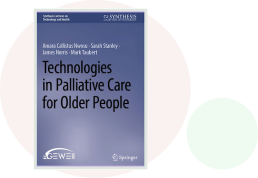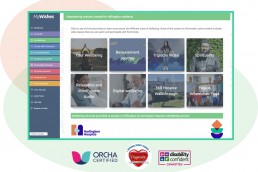Technologies in Palliative Care for Older People
Springer Nature will publish a new book titled, Technologies in Palliative Care for Older People, on 22 December 2025. The hardback and eBook publication will feature as part of its acclaimed Synthesis Lectures on Technology and Health and AGEWELL series.
As the global need for palliative care continues to rise alongside an ageing population, Technologies in Palliative Care for Older People explores how Age Tech and digital innovation can enhance quality of life, support clinical decision making, and strengthen compassionate care for older adults both with serious illness and Palliative Care support. AgeTech refers to the use of differing technologies to benefit older adults.

“Technologies in Palliative Care for older people are being developed and utilised for various purposes. These range from providing improved levels of person-centred care to time savings and cost savings” said James Norris, Founder of MyWishes”.
“This book highlights how technology can be used meaningfully to improve care experiences at some of the most vulnerable stages of life. It also explores ethical considerations and problems that can arise whilst using specific technological interventions”.
Bridging the Gap Between Technology and Compassionate Care
The book provides a cross disciplinary overview of technologies shaping palliative care, offering insights for clinicians, researchers, and policymakers seeking to integrate digital tools both responsibly and effectively. It examines practical and ethical questions around digital health use in end-of-life care. Questions asked often revolve around accessibility, equity, cost, interoperability and the preservation of human connection.

The use of Personas
Each chapter describes the possibilities of how technology can support an older person across different phases of their health trajectory (e.g., diagnosis, supportive care, palliative and end-of-life care).
This is achieved by using ‘personas’ (semi-fictionalised case studies) with practical examples of how existing technological interventions could be used in the real-world to support them.
Dedicated examples are also used to illustrate the potential of Artificial Intelligence (AI) within these contexts. The concluding sections summarise the findings, discuss emerging issues, and identify future directions for research and policy related to palliative care and digital health for older people..

Who is Technologies in Palliative Care for Older People for?
The publication has been written for health practitioners, care professionals, academics, students and those who are interested in technology and aging.
After reading the publication, you will be better equipped to:
- Understand the significance of palliative care needs as people age.
- Appreciate the potential of technology-based products and services to meet those needs.
- Develop understanding of the specific practical, research, and policy challenges in this area.
- Have greater insight into the main directions for future research and innovation.
- Understand areas of good practice when working with people with palliative care needs and technology.

Pre-ordering copies
Hardcover Edition and eBook: The hardcover and eBook editions are available now from:
Paperback Edition: The paperback edition will be available in 2026
About the Authors
The following authors contributed their time and expertise to write the upcoming, Technologies in Palliative Care for Older People publication. Authors shown left to right are:
- James Norris Founder of MyWishes,& The Digital Legacy Association Michael Sobell Hospice, Mount Vernon Hospital, Northwood London, United Kingdom
- Dr Amara Callistus Nwosu. Palliative Care Department, Lancaster Medical School, Lancaster, United Kingdom
- Professor Mark Taubert Palliative Care Department, Velindre Cancer Centre, Cardiff, United Kingdom
Sarah Stanley Liverpool John Moores University, Liverpool, United Kingdom

Other educational news and tutorials









